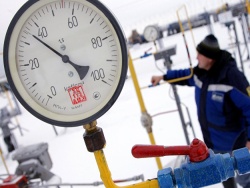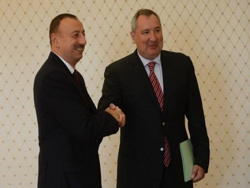
The gas pipeline “Turkish stream” can’t compete with the Azerbaijani project TANAP, the Azerbaijani gas is sold to consumers, and Russian — not yet, said the President of Azerbaijan Ilham Aliyev.
“We have signed contracts to increase production, which will begin in 2018 and should reach its peak in 2020-2021 years,” said Aliyev in an interview to the General Director of MIA “Russia today” Dmitry Kiselev.
The situation around energy projects across the territory of Turkey commented political analyst Vahe Davtyan:
“The statement of the Azerbaijani President about the inability of the Turkish stream to compete with TANAP (TRANS Anatolian pipeline) is unlikely to be understood in the context of potential pipeline gas war for dominance, at least between Azerbaijan and Turkey interested in the implementation of the “flow” and soberly evaluate the prospect of becoming an operator of Russian gas supplies to Europe. Suffice it to say that in the negotiations for the construction of the pipeline, the Turkish side committed to the principle of mutual investments, openly vowing to take on 50% of the investment obligations. In General, the economic and political ties between the two brotherly Islamic States today is so stable that you can immediately eliminate the possibility of any direct confrontation between them. Therefore, Aliyev’s statement should primarily be taken as a message to the Kremlin. But not more than that. And here’s why.
Of course, in considering the question of construction of “Turkish stream” especially in the framework of economic logic, it can be concluded that in competition with the TANAP he clearly would not have serious advantages. First, the contracts to supply gas from Azerbaijani field Shah-Deniz in TANAP up to 16 billion cubic meters have already been signed for years to come. Second, today the EU is more interested in getting gas on this route. The latter is known to be part of the “southern gas corridor” Azerbaijan – Georgia – Turkey – Greece and further on the TRANS-Adriatic pipeline (TAP) to Italy via the Adriatic sea. The extreme interest of the EU in this route, incidentally, is evidenced by the fact that the TAP pipeline does not apply the Third EU energy package, which prohibits one company to produce, transport and distribute gas. This is due to the Third energy package in 2014, Russia was forced to scrap the project “South stream”, and now trying to replace it more adapted to the European legislation, “the Turkish stream”. In respect of the TAP assumes the use of tax incentives, which also makes the “Turkish stream” is less competitive. Along with this, as “Turkish stream”, “southern gas corridor” emphasizes the importance of Turkey as an important energy actor, in this case, as a transit country.
Nevertheless, despite the presence of almost all the preconditions for the unfolding of fierce competition, pipeline wars between Russia and Azerbaijan is expected. For Aliyev’s statement is part of the Azerbaijani political rhetoric that over the past 20 years is based on the principle of multi-vector, mainly due to the strumming “energy weapon”. Azerbaijan traditionally considers itself in two parallel Russian and Western geopolitical realities. The evidence is, say, a close energy cooperation with Russia in frames of the Baku-Novorossiysk oil pipeline and a parallel implementation of the anti-Russian at its core the project of oil pipeline Baku-Tbilisi-Ceyhan oil pipeline or gas pipeline Baku-Tbilisi-Erzerum. The same trend is observed in the transport and logistics sector. Thus, Azerbaijan starting from the mid-90s, has positioned itself as a key participant of TRACECA (international transport corridor Europe-Caucasus-Asia, supported by the EU), along with it is actively integrating into Russian project ITC “North-South”, showing extreme interest in the construction of the railway Qazvin-Rasht-Astara.
So you can assume that this time the Azerbaijani President tries to balance between the two geopolitical forces. On the one hand, it demonstrates the fidelity achieved with EU agreements with other uses this very loyalty to political bargaining with Russia to ensure its Pro-Azerbaijani position on Karabakh conflict – a key factor that can determine the fate of the Aliyev project of introducing the institution of “hereditary democracy”. By the way, in this context should also be considered Aliyev’s statement about the possibility of Azerbaijan’s accession to Eurasian economic Union”.







